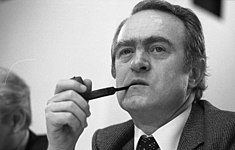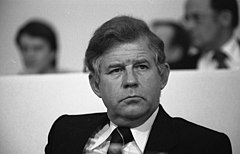
The 2000 North Rhine-Westphalia state election was held on 14 May 2000 to elect the 13th Landtag of North Rhine-Westphalia. The outgoing government was a coalition of the Social Democratic Party (SPD) and The Greens led by Minister-President Wolfgang Clement.

The 2005 North Rhine-Westphalia state election was held on 22 May 2005 to elect the 14th Landtag of North Rhine-Westphalia. The outgoing government was a coalition of the Social Democratic Party (SPD) and The Greens led by Minister-President Peer Steinbrück.
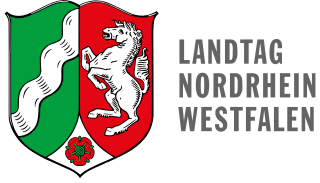
The Landtag of North Rhine-Westphalia is the state parliament (Landtag) of the German federal state of North Rhine-Westphalia, which convenes in the state capital of Düsseldorf, in the eastern part of the district of Hafen. The parliament is the central legislative body in the political system of North Rhine-Westphalia. In addition to passing of laws, its most important tasks are the election of the Minister-President of the state and the administration of the government. The current government is a coalition of the CDU and the Greens, supporting the cabinet of Minister-President Hendrik Wüst since June 2022.
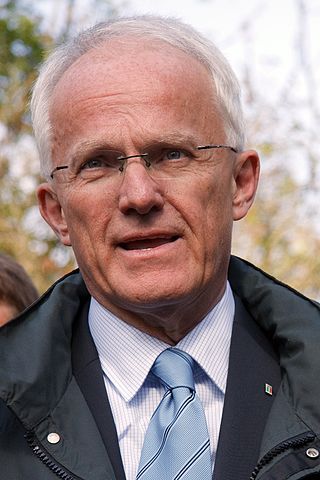
The 2010 North Rhine-Westphalia state election was held on 9 May 2010 to elect the 15th Landtag of North Rhine-Westphalia. The outgoing government was a coalition of the Christian Democratic Union (CDU) and Free Democratic Party (FDP) led by Minister-President Jürgen Rüttgers.

The 1995 North Rhine-Westphalia state election was held on 14 May 1995 to elect the 12th Landtag of North Rhine-Westphalia. The outgoing government was a majority of the Social Democratic Party (SPD), led by Minister-President Johannes Rau.

The 1990 North Rhine-Westphalia state election was held on 13 May 1990 to elect the 11th Landtag of North Rhine-Westphalia. The outgoing government was a majority of the Social Democratic Party (SPD), led by Minister-President Johannes Rau.

The 2013 Lower Saxony state election was held on 20 January 2013 to elect the members of the 17th Landtag of Lower Saxony. The incumbent coalition government of the Christian Democratic Union (CDU) and Free Democratic Party (FDP) led by Minister-President David McAllister was defeated. The Social Democratic Party (SPD) formed a government with The Greens which held a slim, one-seat majority. Stephan Weil was subsequently elected Minister-President.

The 2022 Saarland state election was held on 27 March 2022 to elect the 17th Landtag of Saarland. The outgoing government was a coalition of the Christian Democratic Union (CDU) and Social Democratic Party (SPD) led by Minister-President Tobias Hans.

The 2017 North Rhine-Westphalia state election was held on 14 May 2017 to elect the members of the Landtag of North Rhine-Westphalia. The incumbent coalition government of the Social Democratic Party (SPD) and The Greens led by Minister-President Hannelore Kraft was defeated. The Christian Democratic Union (CDU) became the largest party and formed a coalition with the Free Democratic Party (FDP). CDU leader Armin Laschet was subsequently elected Minister-President.
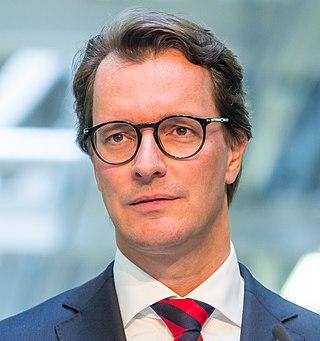
The 2022 North Rhine-Westphalia state election was held on 15 May 2022 to elect the 18th Landtag of North Rhine-Westphalia. The outgoing government was a coalition of the Christian Democratic Union (CDU) and Free Democratic Party (FDP) led by Minister-President Hendrik Wüst.

The 1966 North Rhine-Westphalia state election was held on 10 July 1966 to elect the 6th Landtag of North Rhine-Westphalia. The outgoing government was a coalition of the Christian Democratic Union (CDU) and Free Democratic Party (FDP) led by Minister-President Franz Meyers.

The 1970 North Rhine-Westphalia state election was held on 14 June 1970 to elect the 7th Landtag of North Rhine-Westphalia. The outgoing government was a coalition of the Social Democratic Party (SPD) and Free Democratic Party (FDP) led by Minister-President Heinz Kühn.

The 1975 North Rhine-Westphalia state election was held on 4 May 1975 to elect the 8th Landtag of North Rhine-Westphalia. The outgoing government was a coalition of the Social Democratic Party (SPD) and Free Democratic Party (FDP) led by Minister-President Heinz Kühn.

The 1985 North Rhine-Westphalia state election was held on 12 May 1985 to elect the 10th Landtag of North Rhine-Westphalia. The outgoing government was a majority of the Social Democratic Party (SPD), led by Minister-President Johannes Rau.

The 1947 North Rhine-Westphalia state election was held on 20 April 1947 to elect the 1st Landtag of North Rhine-Westphalia. Prior to the election, the state was governed by a parliament appointed by British occupying authorities comprising 100 members from the Rhineland and 100 from Westphalia, and later four from Lippe. The outgoing government was an all-party coalition headed by Rudolf Amelunxen.

The 1950 North Rhine-Westphalia state election was held on 18 June 1950 to elect the 2nd Landtag of North Rhine-Westphalia. The outgoing government was a coalition of the Christian Democratic Union (CDU), Social Democratic Party (SPD), and Centre Party led by Minister-President Karl Arnold.

The 1954 North Rhine-Westphalia state election was held on 27 June 1954 to elect the 3rd Landtag of North Rhine-Westphalia. The outgoing government was a coalition of the Christian Democratic Union (CDU) and Centre Party led by Minister-President Karl Arnold.

The 1958 North Rhine-Westphalia state election was held on 6 July 1958 to elect the 4th Landtag of North Rhine-Westphalia. The outgoing government was a coalition of the Social Democratic Party (SPD), Free Democratic Party (FDP) and Centre Party led by Minister-President Fritz Steinhoff.
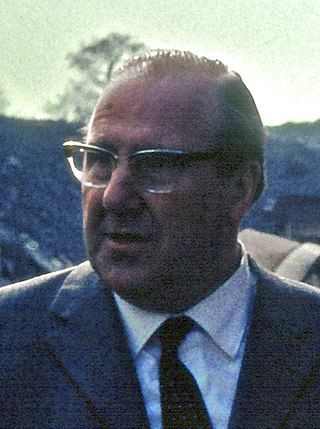
The 1962 North Rhine-Westphalia state election was held on 8 July 1962 to elect the 5th Landtag of North Rhine-Westphalia. The outgoing government was a majority of the Christian Democratic Union (CDU) led by Minister-President Franz Meyers.

The 1950 Hessian state election was held on 19 November 1950 to elect the 2nd Landtag of Hesse. The outgoing government was a grand coalition of the Social Democratic Party (SPD) and Christian Democratic Union (CDU) led by Minister-President Christian Stock, who retired at the election. He was succeeded as SPD lead candidate by Georg-August Zinn.

